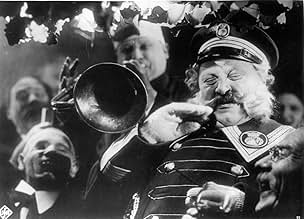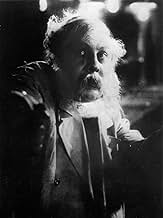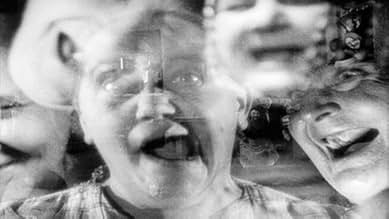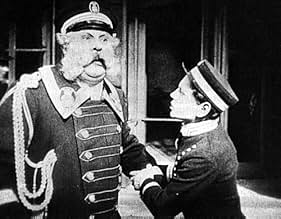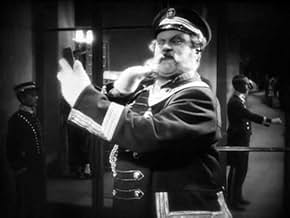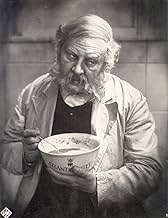IMDb RATING
8.0/10
16K
YOUR RATING
An aging doorman is forced to face the scorn of his friends, neighbors and society after being fired from his prestigious job at a luxurious hotel.An aging doorman is forced to face the scorn of his friends, neighbors and society after being fired from his prestigious job at a luxurious hotel.An aging doorman is forced to face the scorn of his friends, neighbors and society after being fired from his prestigious job at a luxurious hotel.
- Awards
- 2 wins total
O.E. Hasse
- Small Role
- (uncredited)
Harald Madsen
- Wedding Musician
- (uncredited)
Neumann-Schüler
- Small Role
- (uncredited)
Carl Schenstrøm
- Wedding Musician
- (uncredited)
Erich Schönfelder
- Small role
- (uncredited)
- Director
- Writer
- All cast & crew
- Production, box office & more at IMDbPro
Featured reviews
F.W Murnau is best known for his expressionistic horror movies, such as 'Nosferatu' and the excellent 'Faust'. This movie is somewhat different from those, as it's a more personal and down to earth sort of tale. Still, despite this not being a member of the horror genre; Murnau's style still allows for much of the great visuals that made his horror movies great. The story itself has definite horror elements, which although they don't involve vampires or the devil; are arguably more frightening, as it dictates and event that could well happen to anyone. The film tackles the idea of 'downfall', and as the prologue states; one can be a prince one day, but what is he tomorrow? This tale is told through the story of a hotel porter that has worked hard all his life but loses his job through incredible bad luck when the manager catches him taking a break. Heartbroken and humiliated, our hero is offered another job; but it only allows for his humiliation to continue, as the job is that of a lowly bathroom attendant. We then follow his struggle as he comes to terms with his loss and the reaction of his family and neighbours.
F.W. Murnau uses no story cards for this silent film, which shows his flair for storytelling. Imagining some of today's 'great' filmmakers telling a story without dialogue is preposterous, but Murnau shows his prowess by doing just that, and doing it down to a fine art. People often cite 'Citizen Kane' for being the film that took storytelling to the next level, and although it did do that; surely some of the credit has to go to F.W. Murnau. This film features what is perhaps the first ever fantasy sequence, a sequence that is, of course, a favourite of today's cinema. Murnau's technical mastery is also shown in many other sequences, including one in particular that sees a scene appear in the middle of a letter. It's quite unbelievable that this was made over eighty years ago, just due to the amazing work on show in the film.
The film falls down a bit towards the end, because of an ill-advised twist. This was put upon F.W. Murnau by the studio releasing the film, who wanted a happy ending. This is just another example of a studio spoiling a great movie, and even before I saw that piece of information in the trivia section for this movie; it was evident to me that it isn't the way that Murnau wanted to take the story from the way it almost appeared to be tacked on to the end of the film. Still, the hour and ten minutes running up the ending are almost as good as silent cinema gets, and in spite of the studio's best efforts to ruin it; The Last Laugh stands tall as on of Murnau's finest films.
F.W. Murnau uses no story cards for this silent film, which shows his flair for storytelling. Imagining some of today's 'great' filmmakers telling a story without dialogue is preposterous, but Murnau shows his prowess by doing just that, and doing it down to a fine art. People often cite 'Citizen Kane' for being the film that took storytelling to the next level, and although it did do that; surely some of the credit has to go to F.W. Murnau. This film features what is perhaps the first ever fantasy sequence, a sequence that is, of course, a favourite of today's cinema. Murnau's technical mastery is also shown in many other sequences, including one in particular that sees a scene appear in the middle of a letter. It's quite unbelievable that this was made over eighty years ago, just due to the amazing work on show in the film.
The film falls down a bit towards the end, because of an ill-advised twist. This was put upon F.W. Murnau by the studio releasing the film, who wanted a happy ending. This is just another example of a studio spoiling a great movie, and even before I saw that piece of information in the trivia section for this movie; it was evident to me that it isn't the way that Murnau wanted to take the story from the way it almost appeared to be tacked on to the end of the film. Still, the hour and ten minutes running up the ending are almost as good as silent cinema gets, and in spite of the studio's best efforts to ruin it; The Last Laugh stands tall as on of Murnau's finest films.
I just viewed this film on the pristine Kino video release, having seen a poorish print years ago.
One of the great classics of the German silent cinema, hugely influential, this true work of art not only displays the seemingly limitless resources of the UFA studios, but dares to break constantly with convention, particularly by being a "pure" film and dispensing with intertitles, but most spectacularly in its use of the "subjective" camera--creating as far as I know, the first sustained use of "point of view" in the history of movies, which had hitherto shown us action objectively, as it were: the spectator had always merely "observed," as in a third person narrative. Even Griffith and Bitzer's trucking shots, while including "us" in the action, did not represent another character's point of view. Well, after "the Last Laugh," P.O.V. turns up again and again. (See Abel Gance's "Napoleon.") Today the technique is common (necessary!). The most famous shots in "Der Letzte Mann" include the drunken swaying of the room seen through the Doorman's bleary eyes (cinematographer Karl Freund seated in a large swing and pushed back and forth); the opening shot coming down into the lobby by elevator and exiting the gate; and the astonishing vision of the hotel toppling in slow motion over on the poor doorman after his demotion. And can you believe that first night cityscape with the driving rain was all constructed and shot INDOORS?
However, I must say there is an unfortunate message in this drama, that of the merciless German stereotype: fawning before authority and deriding weakness--humiliating the powerless, admiring, almost worshiping the powerful. This is shown by the doorman's vanity and puffed-up self-image, which hinges, it seems, on a splendid uniform and the deference it alone inspires. Position is everything to him, his family, employers, hotel guests and neighbors. This is a shallow world, indeed, a social mentality that I can imagine, without straining too much, easily leading in a few brief years straight to the all-too-successful Gestapo! (I would add that the ending seems to contradict this, but the ending must be discounted; it is a sheer fantasy, "tacked on," really unrelated to the rest of the film and completely out of character.)
One of the great classics of the German silent cinema, hugely influential, this true work of art not only displays the seemingly limitless resources of the UFA studios, but dares to break constantly with convention, particularly by being a "pure" film and dispensing with intertitles, but most spectacularly in its use of the "subjective" camera--creating as far as I know, the first sustained use of "point of view" in the history of movies, which had hitherto shown us action objectively, as it were: the spectator had always merely "observed," as in a third person narrative. Even Griffith and Bitzer's trucking shots, while including "us" in the action, did not represent another character's point of view. Well, after "the Last Laugh," P.O.V. turns up again and again. (See Abel Gance's "Napoleon.") Today the technique is common (necessary!). The most famous shots in "Der Letzte Mann" include the drunken swaying of the room seen through the Doorman's bleary eyes (cinematographer Karl Freund seated in a large swing and pushed back and forth); the opening shot coming down into the lobby by elevator and exiting the gate; and the astonishing vision of the hotel toppling in slow motion over on the poor doorman after his demotion. And can you believe that first night cityscape with the driving rain was all constructed and shot INDOORS?
However, I must say there is an unfortunate message in this drama, that of the merciless German stereotype: fawning before authority and deriding weakness--humiliating the powerless, admiring, almost worshiping the powerful. This is shown by the doorman's vanity and puffed-up self-image, which hinges, it seems, on a splendid uniform and the deference it alone inspires. Position is everything to him, his family, employers, hotel guests and neighbors. This is a shallow world, indeed, a social mentality that I can imagine, without straining too much, easily leading in a few brief years straight to the all-too-successful Gestapo! (I would add that the ending seems to contradict this, but the ending must be discounted; it is a sheer fantasy, "tacked on," really unrelated to the rest of the film and completely out of character.)
Although the Golden Twenties of German cinema, a golden age corresponding approximately to the era from the making of The Cabinet of Dr. Caligari in 1919 to Hitler's absorption of the German film industry for the purposes of the Nazi regime, has come to be widely associated in public consciousness with the grotesque, the mystical and the fantastic of German Expressionism, indeed with such iconic figures to spearhead it as Nosferatu, the Somnabulist, Dr. Caligari, Mephisto and the Golem, all of them having their roots in the folklore or a fantastic reimagined past, there was also a more realistic, if no less tragic, depiction of a middle-class present with a focus on a psychological, as opposed to metaphysical, aspect.
By 1924 the acceptance of the Dawes Plan by Germany had lulled the German Republic into a sense of economic stability that was to last until the stock market crash in 1929. It was that same stability that most hurt the German film industry, as the Dawes Plan imposed the reduction of all exports, leaving many independent production companies without foreign markets for their product. In the years to come Hollywood would seize this unique financial opportunity to break down its only European rival, but before major box-office flops like Fritz Lang's epic rendition of Die Nibelungen (1924) and Metropolis (1927) and FW Murnau's Faust (1926) would bring UFA to its proverbial knees in debt to German banks, little films like The Last Laugh (1924) and Varieté (1925) were the toast of the town in both sides of the Atlantic.
Emil Jannings plays an aging hotel porter who takes great pride and pleasure in his job and especially the lavish uniform that comes with it. In the miserable middle-class neighborhood he lives, being able to wake up in the morning and go to work dressed like in such a prestigious uniform is like being a general. That is until a younger man is hired in his place and he's demoted to the, undignified in his mind, job of lavatory attendant. Not bearing to lose face back home with gossiping neighbors and relatives, the old porter steals back his uniform and returns home as if nothing happened, the uniform a symbol not only of his social status but also of purpose in life.
What is most striking about The Last Laugh is the way Murnau externalizes the psychological in a grand, theatric way that could only work on stage and in silent cinema. Watch for example the look of pure anguish and horror in Janning's face when he's asked to turn in his uniform, stripping it off like he's being skinned alive. Recoiling without it into a state of defeat and abandonment like a man stripped of his own identity, with nothing to live for.
Obsessed with artistic control and exercising complete authority over the minutest details of lighting and décor, German directors pushed for an increasingly studio-bound cinema to the point that UFA in the years between 1919 and 1927 became the best equipped movie studio in the western world. The Last Laugh is no exception. The facades of apartment blocks in the background with light slanting over them, the low-class neighborhood, the busy street in front of the hotel, all of them replicated in great detail within studio limits. It's within this geography that Murnau transposes Jannings' internal world. As is proper for the inward journey of the self the protagonist faces, the aging porter starts at the busy front of the hotel only to find himself exiled in the dark bowels of the basement where he remains hidden, that is until the film's tacked-on happy ending.
The only false note in an otherwise perfect film is the happy ending Murnau and scriptwriter Carl Mayer (of Caligari fame) were forced to devise by UFA executives anxious for the box office success of their movie. It's not that it doesn't work because such a tragic tale precludes a happy ending, after all one of the most memorable endings in all cinema is that of Capra's It's a Wonderful Life and it doesn't get any more saccharine than that, but because it happens in such a tacked-on deus-ex-machina fashion that it feels like a complete cop-out. It's lame now and it was lame then and Murnau no doubt understood that as he flashes a title card (the only title card in the film) more or less apologizing that "that's how the movie would've ended if I didn't have a boss to keep happy so here's a they-lived-happily-ever-after epilogue, take it with a pinch of salt or ignore it altogether". It's noteworthy however that it's not pure schmaltzy tripe. It feels as though Murnau is taking a perverse, vulgar pleasure in delivering what was asked of him.
Exceptionally photographed, with a modern feel to Murnau's camera-work that places it well ahead of its time compared to other silents, a great example of purely visual storytelling without the cumbersome crutches of the title cards, The Last Laugh stands not only as a triumph of Weimar cinema but as masterpiece almost 100 years later.
By 1924 the acceptance of the Dawes Plan by Germany had lulled the German Republic into a sense of economic stability that was to last until the stock market crash in 1929. It was that same stability that most hurt the German film industry, as the Dawes Plan imposed the reduction of all exports, leaving many independent production companies without foreign markets for their product. In the years to come Hollywood would seize this unique financial opportunity to break down its only European rival, but before major box-office flops like Fritz Lang's epic rendition of Die Nibelungen (1924) and Metropolis (1927) and FW Murnau's Faust (1926) would bring UFA to its proverbial knees in debt to German banks, little films like The Last Laugh (1924) and Varieté (1925) were the toast of the town in both sides of the Atlantic.
Emil Jannings plays an aging hotel porter who takes great pride and pleasure in his job and especially the lavish uniform that comes with it. In the miserable middle-class neighborhood he lives, being able to wake up in the morning and go to work dressed like in such a prestigious uniform is like being a general. That is until a younger man is hired in his place and he's demoted to the, undignified in his mind, job of lavatory attendant. Not bearing to lose face back home with gossiping neighbors and relatives, the old porter steals back his uniform and returns home as if nothing happened, the uniform a symbol not only of his social status but also of purpose in life.
What is most striking about The Last Laugh is the way Murnau externalizes the psychological in a grand, theatric way that could only work on stage and in silent cinema. Watch for example the look of pure anguish and horror in Janning's face when he's asked to turn in his uniform, stripping it off like he's being skinned alive. Recoiling without it into a state of defeat and abandonment like a man stripped of his own identity, with nothing to live for.
Obsessed with artistic control and exercising complete authority over the minutest details of lighting and décor, German directors pushed for an increasingly studio-bound cinema to the point that UFA in the years between 1919 and 1927 became the best equipped movie studio in the western world. The Last Laugh is no exception. The facades of apartment blocks in the background with light slanting over them, the low-class neighborhood, the busy street in front of the hotel, all of them replicated in great detail within studio limits. It's within this geography that Murnau transposes Jannings' internal world. As is proper for the inward journey of the self the protagonist faces, the aging porter starts at the busy front of the hotel only to find himself exiled in the dark bowels of the basement where he remains hidden, that is until the film's tacked-on happy ending.
The only false note in an otherwise perfect film is the happy ending Murnau and scriptwriter Carl Mayer (of Caligari fame) were forced to devise by UFA executives anxious for the box office success of their movie. It's not that it doesn't work because such a tragic tale precludes a happy ending, after all one of the most memorable endings in all cinema is that of Capra's It's a Wonderful Life and it doesn't get any more saccharine than that, but because it happens in such a tacked-on deus-ex-machina fashion that it feels like a complete cop-out. It's lame now and it was lame then and Murnau no doubt understood that as he flashes a title card (the only title card in the film) more or less apologizing that "that's how the movie would've ended if I didn't have a boss to keep happy so here's a they-lived-happily-ever-after epilogue, take it with a pinch of salt or ignore it altogether". It's noteworthy however that it's not pure schmaltzy tripe. It feels as though Murnau is taking a perverse, vulgar pleasure in delivering what was asked of him.
Exceptionally photographed, with a modern feel to Murnau's camera-work that places it well ahead of its time compared to other silents, a great example of purely visual storytelling without the cumbersome crutches of the title cards, The Last Laugh stands not only as a triumph of Weimar cinema but as masterpiece almost 100 years later.
Warning - Possible spoilers lie within.
This is the first silent movie I have watched in its entirety, having previously found myself becoming restless and distracted, I normally find them quite difficult to watch. I came across the Criterion edition of the movie in a large collection of Laserdiscs that I purchased recently, and decided to give it a try. I was speechless.
'The Last Laugh' (or 'The Last Man', as its translation would lead you to believe, is a touching story from director F.W. Murnau about an un-named Hotel Porter & Doorman (played excellently by Emil Jannings) who, through no fault of his own, is demoted to Lavatory attendant, and we hereby watch as his life collapses around him. It's an incredibly emotional story - during his downfall, as his friends and family mock him, Jannings' depressed, hunched-over figure can be painfully sad to watch. I found myself filling up in the scene when he finally hands his beloved porter's uniform over to the night watchman.
A landmark in the era of silent films, Murnau used some very clever camera tricks (such as smearing vaseline on the camera lens for 'dream' sequences). It was also one of the first films to use a completely free moving camera with no tripod, testimony to the success of this can be seen immediately in the first scene as the film starts. There are also no title cards in the film. Nor are they needed - The story is carried perfectly by the actors and on no occasion do you feel that you don't know what is going on.
I won't give anything away here, but there are some people that may feel the ending is a little out of place - However, I had grown so fond on Jannings' character that in a way, I was relieved to see the film move on from the final scene where he is sat hunched on the seat in the washroom - and for him to finally have 'The Last Laugh' so to speak :o)
If you have any interest in old cinema, and have not seen this, or just fancy a change from all of the samey Hollywood flicks being churned out right now, I suggest you hunt out a copy right away. Highly recommended.
This is the first silent movie I have watched in its entirety, having previously found myself becoming restless and distracted, I normally find them quite difficult to watch. I came across the Criterion edition of the movie in a large collection of Laserdiscs that I purchased recently, and decided to give it a try. I was speechless.
'The Last Laugh' (or 'The Last Man', as its translation would lead you to believe, is a touching story from director F.W. Murnau about an un-named Hotel Porter & Doorman (played excellently by Emil Jannings) who, through no fault of his own, is demoted to Lavatory attendant, and we hereby watch as his life collapses around him. It's an incredibly emotional story - during his downfall, as his friends and family mock him, Jannings' depressed, hunched-over figure can be painfully sad to watch. I found myself filling up in the scene when he finally hands his beloved porter's uniform over to the night watchman.
A landmark in the era of silent films, Murnau used some very clever camera tricks (such as smearing vaseline on the camera lens for 'dream' sequences). It was also one of the first films to use a completely free moving camera with no tripod, testimony to the success of this can be seen immediately in the first scene as the film starts. There are also no title cards in the film. Nor are they needed - The story is carried perfectly by the actors and on no occasion do you feel that you don't know what is going on.
I won't give anything away here, but there are some people that may feel the ending is a little out of place - However, I had grown so fond on Jannings' character that in a way, I was relieved to see the film move on from the final scene where he is sat hunched on the seat in the washroom - and for him to finally have 'The Last Laugh' so to speak :o)
If you have any interest in old cinema, and have not seen this, or just fancy a change from all of the samey Hollywood flicks being churned out right now, I suggest you hunt out a copy right away. Highly recommended.
Der Letzte Mann is nothing short of the epitome of viewing pleasure. Beautifully shot, the urban landscape in which a noble doorman earns his keep (and humanity) is throughout dream-like, infused with a decidedly ethereal quality. Added to a magical visual backdrop is a haunting musical score, highlighted by sweeping cello chords which cut straight to the heart. With regard to prominent themes, the picture speaks volumes about the fragility of human existence and, specifically, human dignity. The shallow and arbitrary nature of a society bent predominantly on the acquisition and elevation of pecuniary wealth, as well as the perseverance of the individual through it all, is illustrated masterfully through both the zenith and nadir of the doorman's existence, as documented in this truly excellent work of the interwar period.
Did you know
- TriviaThe first "dolly" (a device that allows a camera to move during a shot) was created for this film. According to Edgar G. Ulmer, who worked on the film, the idea to make the first dolly came from the desire to focus on Emil Jannings' face during the first shot of the movie, as he moved through the hotel. They obviously didn't know how to make a dolly technically, so they created the first one out of a baby's carriage. They then pulled the carriage on a sort of railway that was built in the studio.
- GoofsWhen the porter comes home with the stolen coat, the third button down (which fell off earlier) is still there until a close-up of him at the door.
- Alternate versionsThere is an Italian edition of this film on DVD, re-edited in double version (1.33:1 and 1.78:1) with the contribution of film historian Riccardo Cusin. This version is also available for streaming on some platforms.
- ConnectionsEdited into Allemagne 90 neuf zéro (1991)
- How long is The Last Laugh?Powered by Alexa
Details
- Release date
- Country of origin
- Language
- Also known as
- Le dernier rire
- Filming locations
- UFA Studios, Berlin, Germany(Studio)
- Production company
- See more company credits at IMDbPro
Box office
- Gross US & Canada
- $94,812
- Runtime
- 1h 28m(88 min)
- Color
- Sound mix
- Aspect ratio
- 1.33 : 1
Contribute to this page
Suggest an edit or add missing content

